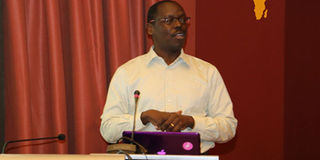78pc of people affected by food shortages: study

Twaweza Executive Director Aidan Eyakuze
Dar es Salaam. Seventy-eight per cent of people in rural and urban areas have experienced food shortages in the last five months, according to a new report by the advocacy organisation Twaweza.
Eighty-four per cent of rural residents reported being affected, while the figure for urban areas is 64 per cent.
More than two thirds of households (69 per cent) feared running out of food, 51 per cent did not have enough food to feed all household members, while 50 per cent reported having at least one member who skipped a meal because food was not available.
Releasing the report titled Hunger Pangs: Food (in) Security in Tanzania, Twaweza Executive Director Aidan Eyakuze said the study involved 1,800 respondents across Mainland Tanzania between September 14 and 26, last year, with 1,610 others reached between February 9 and 15, this year.
The findings are based on data from Sauti za Wananchi, a nationally representative mobile phone survey. The findings are based on data collected from Mainland Tanzania only.
“While the number of citizens worried about food shortage increased to 65 per cent in February, this year, from 45 per cent in September, last year, half of the citizens said they didn’t have enough food to feed their householders as compared to 43 per cent recorded in September, last year,” he said.
In February, 35 per cent of citizens reported that a household member had gone without eating the whole day due to lack of food over the last three months compared to 21 per cent before September 2016.
Mr Eyakuze said rising food prices could possibly explain why most of those polled were unable to meet their basic food needs, citing data from the Bank of Tanzania which showed that a kilogramme of maize sold at Sh1,253 this year compared to Sh432 early last year.
“The current shortages and ongoing food insecurity underline the context of general vulnerability and income poverty. A total of 8 out of 10 citizens (80 per cent) report that their households do not receive enough income to cater for their daily needs with figures varying slightly among groups.”
The Twaweza study corroborates widespread concern since early this year that the country was facing food insufficiency due to crop failure following a prolonged spell of drought in some areas and extreme poverty in rural areas where families are unable to afford food whose prices have recently skyrocketed in recent months.
Advocacy groups, politicians and the media were censored by the government officials after they reported food shortages, hunger and livestock deaths in some of the affected areas.
The government’s official position was that there was no hunger in the country, with President John Magufuli publicly accusing some media outlets and businesspeople of conspiring to raise fears for speculative purposes.
The President warned regional leaders against declaring hunger in their areas, saying the government saw no justification for doing so.
He stressed at public meetings that the government would not distribute famine relief despite calls for intervention by a cross-section of political and religious leaders.
However, Prime Minister Kassim Majaliwa told Parliament last month in Dodoma that 55 district were experiencing drought and the threat of food shortages.
He said nearly 1 million people needed food aid following crop failure in their areas, adding that authorities would distribute relief for those in the worst affected areas.
Mr Eyakuze noted yesterday that the study was a depiction of the real situation at the time sampling was done.
“People said (in the study) they have been hit hard by food shortages. We would like the government to acknowledge the situation and encourage rapid intervention to prevent a bigger crisis,” he said.
Speaking at yesterday’s function, Kigoma Urban MP Zitto Kabwe said his ACT- Wazalendo party had been vindicated by the Twaweza report. The party has been vocal in urging the government to declare a national disaster.
“Opinion has been divided on this matter, but we can now confidently say that our fears have been scientifically proven,” he said, and repeated his party’s call to President Magufuli to declare a national crisis.
“Official reports have consistently shown that the country has been facing food shortages since last September, but government officials have been steadfast in refuting what is there for all to see.”
Mr Kabwe said in the current financial year the government has paid little attention to empowering the National Food Reserve Authority, saying its budget was slashed to Sh20 billion from Sh78 billion the previous year. The MP warned that recent changes in the handling of farmers’ input subsidy would affect productivity.
“The government should intervene and rescue one third of the population (about 15 million) who this report says go to hungry. Reserve food should be released to stabilise prices in the most affected areas.”
The United Nations Resident Coordinator and UNDP Resident Representative, Mr Alvaro Rodriguez, said factors of climate change partly contributed to inadequate rainfall this year and that the country’s rain-fed agriculture had worsened the situation.
“But issues of availability of food, accessibility and affordability should be paid attention to as the country addresses the problem,” he said.
Ministry of Agriculture, Livestock and Fisheries communication officer Issa Sabuni said food insecurity had affected a number of Southern African Development Community member countries, adding that it was not only Tanzania.




